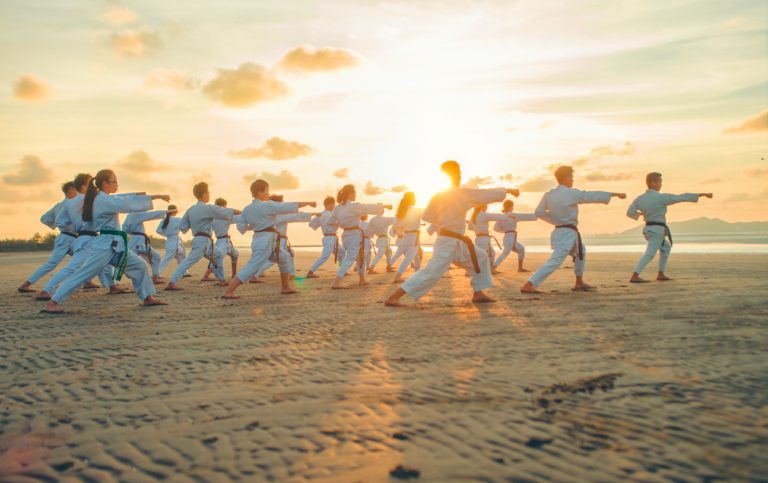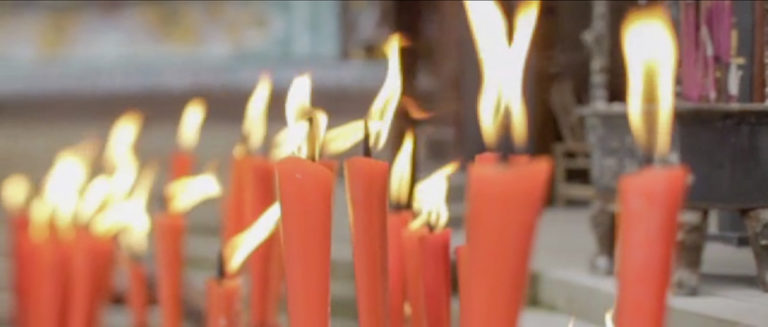Several years back I was in a taxi cab headed somewhere and the guy sitting in the front seat was a Fullbright Scholar here in China to study Buddhism. I jokingly asked him “What Buddhism?” and he huffed and puffed and got out of the cab.
He probably thought and still thinks I am an idiot. But maybe he was angry for a reason. Is Buddhism alive in China? How many of you have visited Buddhist temples or monasteries in China and felt like you were in a religious building? How many of you felt like tourists?
It’s easy to forget that Buddhism originated in India, but flourished in China, because much of the religion has been co-opted by commerce and the state. It’s a rare encounter with a real monk in the cities of China.
Anyone who has traveled in Laos or Thailand will notice the vast difference between Buddhism there and Buddhism in the Middle Kingdom. I am surprised when I see or meet the “real thing” in China.
I want you to take a look at this photo right here:

This is a rare and beautiful image.
This image tells me that Buddhism is alive in China, regardless of the Disneyland theme parks that surround most temples today. Regardless of the sinners who use the religion to feel better about themselves. Sinners remain a constant; theme parks are a product of the Age of Science. God is dead, right? But it’s handy being immortal. You crop up in the most unexpected of places.
But now I want you to take a look at this photo right here:

This is a common and disturbing image.
This image robs me of any hope I have that the state will ever reform itself.
Anyone who has been to Tibet comes back awed by the faith of the people. Tibetans have a faith that few other nations on this earth can claim. This is a race of people for which pilgrimage is the most important thing a person can do and when they do it they do it like no other: prostrating and rising like an inchworm across the entire plateau.
The Chinese state media offers these two pathetic pieces of cowardice and self-abasement as justification for the imprisonment of Tibetan monks:
This exercise in faulty logic by the worm-who-hides-behind-a-false-name Hua Zi
And this parroting of idiocy by Li Decheng, He Who Has No Soul.
They don’t even have the courage to write the same words scrawled across the placards hanging around the necks of the monks:
Anti-State Splittists.
That’s what self-immolation in Tibet is about for the state. Not Buddhism. The state knows nothing of Buddhism. Buddhism belongs to the monk who prays for the dead so that their souls may find their way home; Buddhism belongs to the pilgrim whose skin is raw from the rocks of the Himalayas; Buddhism belongs to the woman and her beads, chanting and caressing the prayer wheels on her millionth walk around the mountain. And yes, Buddhism belongs to the monk who kills himself for his faith.
It does not belong to cowards and bullies and oppressors.
So keep the word out yer mouth, Li Decheng and Hua Zi, if those even are your real names.
UPDATE 12/4:
I lack the knowledge to argue from a Buddhist standpoint. I just get angry and write it all down. But this article here in the Asia Times does it for me. Highly recommended. A quote from the story (actually from a Vietnamese Buddhist monk in the 1960s):
To burn oneself by fire is to prove that what one is saying is of the utmost importance. There is nothing more painful than burning oneself. To say something while experiencing this kind of pain is to say it with the utmost of courage, frankness, determination and sincerity.
The Vietnamese monk, by burning himself, say with all his strengh [sic] and determination that he can endure the greatest of sufferings to protect his people. But why does he have to burn himself to death? The difference between burning oneself and burning oneself to death is only a difference in degree, not in nature. A man who burns himself too much must die. The importance is not to take one’s life, but to burn. What he really aims at is the expression of his will and determination, not death. In the Buddhist belief, life is not confined to a period of 60 or 80 or 100 years: life is eternal. Life is not confined to this body: life is universal. To express will by burning oneself, therefore, is not to commit an act of destruction but to perform an act of construction, ie, to suffer and to die for the sake of one’s people.
Like the Buddha in one of his former lives – as told in a story of Jataka – who gave himself to a hungry lion which was about to devour her own cubs, the monk believes he is practicing the doctrine of highest compassion by sacrificing himself in order to call the attention of, and to seek help from, the people of the world. [3]







5 thoughts on “Buddhism in China”
http://www.google.com/hostednews/afp/article/ALeqM5hjPVIYr7RT_USnQIRz8BpWZ7cs6Q?docId=CNG.87ce48a60c54488621b495fd68e4dbf8.621
You’ve done it again, Sascha.
I went in search of some Buddhist retreats on arrival here in Xi’an. I did find a temple where I could pay nearly a 1000 kuai for the weekend, sadly that wasn’t going to be for me. A friend who had tried it told me that silence wouldn’t be observed, there wouldn’t be much meditation being done but there would be a good bit of tea drinking and chatting taking place.
A real good bit of Buddhism would go down well here. I do now know of a beautiful retreat centre being built up in the mountains, which is going to be run on a donation based system, but they are certainly few and far between.
yeah too bad. if China had any inkling of the market out there for retreats …
that’s why we all go south.
When I was in China I studied under a lay monk (he wasn’t actually a monk as he was married) and it was very useful. Though I’d agree with you that the majority of monks and temples in China currently aren’t good places to study. However, I did go to a retreat in bai lian si near shi jia zhuang (I think) which was ok.
I think there will be a resurgence of interest in buddhism and sincere practice once the political situation opens up a bit.